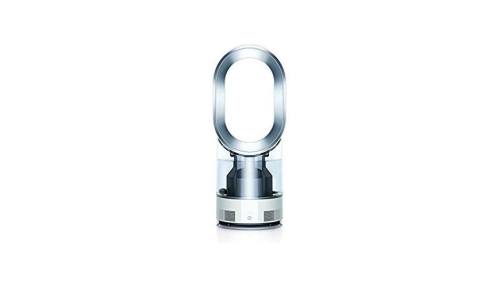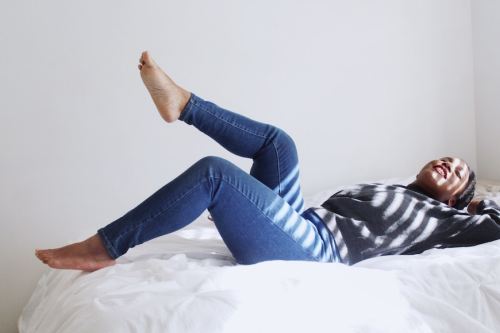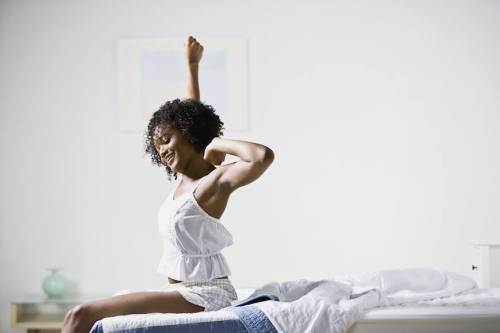In waking hours, there’s not much about the summer that I don’t love: the sunshiny temperatures, the leafy green trees that lazily perch themselves over the streets, the long balmy nights, and the list goes on forever. But the party ends the moment it comes time for sleep because every night I’m forced to choose between flipping off my window unit air conditioner (and subsequently sweating through the night) or being blasted by cold air.
Despising the way it feels to wake up hot with beads of sweat on my back and my brow, I keep the AC whirring, which actually might not be such a great idea. “If people aren’t vigilant about maintaining their AC by cleaning it and changing the filters, it can accumulate mold and allergens along the vents and filters and this can be dispersed into your home, leading to allergy symptoms like a sore throat,” explains Neeta Ogden, MD, an Edison, New Jersey allergist. “Plus, some people just don’t do well with the forced cold air—it’s almost like an irritant to their airway, similar to cold, brisk air outside.”
Essentially, the artificial chill is creating winter-like sleeping conditions, so it’s no wonder that I’m waking up with the cool season’s worst issues like an itchy throat, stuffy nose, and dry skin, despite slathering on moisturizer ahead of bed. But what’s a healthy girl (who’s not willing to break up with her box unit) to do? Here, with the help of a doctor and scientist, I find out how to combat this to gain even better sleep and awake well-rested come morning. Keep scrolling to find out how to hack your bedroom for better sleep.

The benefits of sleeping with a humidifier will make you never snooze without one again
Cranking the AC can obviously eff with your sleep—mainly because units work by pulling in warm air and pushing it through coils to cool and dehumidify it. “Long hours of being exposed to air conditioning can lead you to experience some of the same symptoms you would in the winter–chapped lips, dry skin, dry eyes,” says Jessica Le Dinh, a Dyson design engineer. She adds that “seeing as we spend 90 percent of our lives inside, it’s important our indoor air is at an optimal humidity level all year round.”
From a quality control POV, the best way to address your arid issues is pulling out (or investing in) a humidifier. (According to studies, the optimal humidity levels for sleep are between 40 and 60 percent, but it’s unlikely your home’s meeting this threshold if you’re cooling it artificially.) Plus, having a properly humidified room can also help your case for sleeping better in the first place. One study found that by sleeping in a room that’s the right humidity, participants increased the median number of hours spent asleep versus snoozing in a drier one.
Those benefits only increase if you have respiratory issues, according to Dr. Ogden. “For people with allergies and asthma, a humidifier can help keep the airways moisturized, which is very helpful because dryness can make congestion and allergy symptoms worse,” she says. Just remember that like your AC unit, you need to clean it on the reg.
Convinced a humidifier could help with all of the above, I decided to test the theory by giving the Dyson Humidifier some summer airtime. (It was my pick, in part, because it uses a double dose of ultra-violet light to kill 99.95% of the bacteria in the air its system circulates.)
My take? Glad you asked: All-in-all the humidifier accolades celebrated in the winter have cred in the summer as well. It made my sleeping experience much more comfortable: I haven’t noticed an itchy throat since beginning to use it, and when I wake up, my skin still feels supple and dewy versus in need of a drink…at 6 a.m. So, if you notice that your air indoors feels dry, don’t shrug off out-of-season symptoms, a humidifier could definitely help you sleep better—even in summer.

For the love of God, change your sheets
If you have allergies, chances are it’s affecting your sleep. “Allergies left untended can lead to chronic symptoms such as nasal congestion, which can then lead to sinus infections, bronchitis, snoring, cough—all of which can affect sleep and leave you feeling less rested,” explains Dr. Ogden. So, it’s super important to know all the ways to deal with what could be A) keeping you up at night or B) keeping you from waking up fully rested in the morning.
Start by knowing this: The main allergens that you should be worried about are dust mites, and they can make their way deep into our mattresses, sheets, and bedding. That’s bad, but this is worse: They feed off human skin scales. So, it’s wildly important to buy a hypoallergenic mattress, change your sheets at least once a week (and to launder them in hot water), and toss your pillow yearly, according to Dr. Ogden.
“Chronic exposure to dust mites can lead to chronic allergy symptoms, particularly nasal congestion, snoring, and coughing, which can interfere with sleep,” she explains. If it comes time to redecorate, you can also skip the wall-to-wall carpet in bedrooms in lieu of wooden floors with rugs that can be tossed into the wash.
The last thing to consider is using your timer or energy-saving setting on the AC, so that it’ll help to monitor the temperature of the air all night without running continuously and totally drying out the air. And then, you can rest easy knowing that you’ve done everything you can for your best sleep yet.
BTW: Your temperature is hugely associated with how well you sleep and if you have a hard time catching ZZZs, this hit supplement could be a game-changer for you.
Sign Up for Our Daily Newsletter
Get all the latest in wellness, trends, food, fitness, beauty, and more delivered right to your inbox.
Got it, you've been added to our email list.











